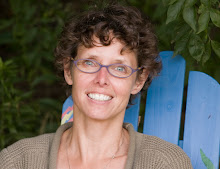
A great (and fun) narrative study
If I were teaching a class on narrative, I would design a couple of classes around
Stranger Than Fiction. I just watched it last night with my sons and it is wonderful! You'll find all the elements of First Order awareness...it is a story conscious of itself. It weaves together the mystical and the possible with the limiting and the joyless and comes up with something really extraordinary. And there's a lot of fun besides. (I especially love the gift Harold brings Annie--and the questions the professor asks Harold to help him determine what kind of story he's in.) If you love being able to see the workings of the machine--and to watch characters who really get a living sense of how we are shaped by our narratives--take an evening and watch (and rewatch) this movie.
Update: If you
are teaching a class in narrative, here's a good resource for you if you want to teach with this movie. The script is avaliable as a free download here:
http://www.dailyscript.com/scripts/Stranger-Than-Fiction.pdf (Thank you, Zach Helm!)
Labels: narrative, scripts, story, teaching
Notes and Themes
Last night I found an old notebook from a few years ago in which I'd jotted bits of conversation and highlighted themes. I had recorded a bit of an overheard "first date" at a coffeeshop, where a man talked in depth about his sleep apnea to his wilting listener. I'd reflected on a conversation with a man I'd just met whose story was filled with "they won't let me do it" themes--his wife didn't believe in his dream, his doctor didn't think he should do what he wanted to do, and so on and so on. I had pieces of another conversation in which the person didn't feel she chould choose what others her age were choosing because she was still (even though she was a legal adult) controlled by the choices her mother wanted her to make.
There are so many themes around us, all the time, bubbling up through the stories we tell and even our quickest exchanges of information. I wish I could capture it all, piece it together, understand it. I have a feeling that if we really had "the ears to hear" and "the eyes to see," we would be able to help each other share the light of what we're really living out in a truthful, powerful, root-deep way.
Naming "Too-Muchness"
In an email conversation with a friend this morning, she mentioned the phrase "too-muchness" and to me it was like ringing a bell. What a powerful name for something many of us can identify with. Especially if you work in the helping professions--or you in any way invest your energies in trying to make the world a better place--you can be overwhelmed with a sense of "too-muchness" that says, "There's too much to do; what can one person accomplish? Look how big this problem is! There are too many people who need me..."
What do we do when we face a sense of "too-muchness"? Do we see ourselves as small grasshoppers standing before giants? If so, we're in good company (remember the scouts Moses sent into the promised land?). Do we run away and try to forget the problem? We might find ourselves in a whale's belly, doing some deep thinking with rotting fish, like Jonah. Or do we turn to an inexhaustible source for help, light, and protection--like Job, David, Jesus, Mohammed, Rumi, and countless untold others?
This reminds me of
Karen Horney's work about whether we move toward people, move against people, or move away from people as a coping strategy. What do you do with too-muchness? I think my reactive instinct has been to go aloof (move away), but I'm gradually learning to stay in the moment and ask instead, "Hmmm...what is this too-muchness showing up to teach me?"
Whatever it is, if it's here, I must be ready for it. :)


 RSS feed
RSS feed

